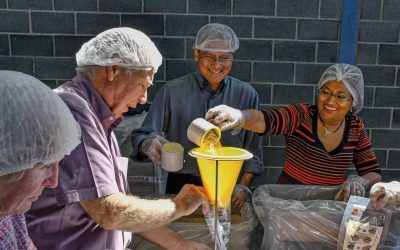Ade Adepitan is always so busy that finding a chance to spend a little time with him can be a challenge. However, once he does find the time it’s always a pleasure to talk with someone who takes such a positive view of life and enjoys every minute of it.
Having contracted polio in Nigeria at an early age the future in that country at the time must have seemed bleak so his mother moved the family to Plaistow in the UK when he was three – a few years later his father followed.
Through his school life he wore callipers to help his paralysed left leg. However, in his late teenage years he switched from the callipers to a wheelchair to help him achieve his long held dream of playing basketball for Great Britain at a Paralympic Games.
He has achieved that goal and a whole lot more. When I caught up with him he had just returned from presenting the Paralympic Games in Rio de Janeiro for Channel 4.
We started by discussing the Rio Paralympics and his impressions of the achievements, Ade told me, “I don’t think it has ever happened before that a nation has hosted a games and at the following games surpassed their medal total. All the signs were there when you saw what the Olympic Team did and the Paralympic Team has always historically done better, mind you we were helped with Russia not being there!”
I joked about that but Ade went on to clear the point, “It just meant that more medals were up for grabs.”
He went on to describe his impressions of Rio, “There was a wonderful atmosphere of euphoria out there and once the medals started rolling in we knew that viewers would keep watching and it made for a better show. It’s that fine line because you don’t want to appear so biased on the TV. We come from a nation that has many nationalities so you do have to have that sense of balance as well. But I’m sure people understand we are British and we are going to be cheering for our people.”
I went on to ask Ade about the perceptions of disabled people in this country and if the Paralympic Games really help to change people’s view. He explained, “You are not going to feel any pity for the guys winning medals and the impression it is giving to the public is, look, you can have a disability but you can be strong, you can be independent and you can live a life as good as any able bodied person, if not better. These guys, the Paralympians, have become aspirational figures now.”
“Young kids will be watching and think I’d like to be like Jonnie Peacock or Ellie Simmonds, they’ve become heroes now in their own right. When I was young able bodied athletes were my heroes, but now it’s Paralympic athletes and for me it’s like a dream come true. Now I’m presenting the games I feel like one of the luckiest people in the world.”
Ade explained that he had been watching the Olympic Games since 1980 but got really into it when he was just 11 watching the Los Angeles Games.
The Paralympics is able to do two things, it is an elite sports event and also a beacon to change perceptions of able bodied people to disabled people. For me changing perceptions is a very big thing.”
I had to ask what his stand out moment of the Rio Paralympic Games was, he thought for just a moment and said, “For me it was the first Sunday of the games being in the Olympic Park just seeing how many people were in there and I remember pushing through the park on my own to the IPC (International Press Centre) as I wanted to sample the atmosphere.”
“The park was absolutely rammed and I remember seeing this young girl in a wheelchair being pushed by her parents through the park looking really excited and she saw me and looked at my wheelchair and myself and she saw I wasn’t being pushed by a helper and you could see her thinking wow it could be me in years to come.”
Ade continued, “For me the games are more than just about sport. A Telegraph writer presenting with us talked about the duality of the games, which is a really good phrase and he says the Paralympics are able to do two things: it is an elite sports event and also a beacon to change perceptions of able bodied people to disabled people. For me changing perceptions is a very big thing.”
We then began to talk about polio and Nigeria as I know Ade Adepitan keeps a close eye on what is happening in his birth country.
I put it to him it was a setback that three cases were reported this year. “I was so pleased to hear that Nigeria was polio free and this is now a setback and it feels like the air has been deflated out of it. I know how difficult it is to eradicate polio. I’m heartened by the fact it is only three cases, we had a setback like this in 2001 but this is not like that,” he said.
Ade had visited the northern part of Nigeria to report on polio for a documentary programme a few years ago when I first met him. He continued, “I’m more concerned about the war torn areas like Syria because no one knows what is going on there and we have no idea what is happening there.”
I informed Ade that Rotary had made a large grant to Nigeria to help with the vaccination campaign.
“Rotary always does a lot of good work on polio you are one of the leading charities on polio if not the leading charity. Everybody knows and if they don’t they’ve been sleeping under a rock. For me in terms of what is happening in Nigeria now all the agencies must have a blueprint on how to tackle the issue. The last mile is always the toughest.” I told him jokingly he would know that better than I, since he was in such good humour and I would find out later why that was so.
A short series Ade had done on New York City was broadcast a few weeks ago so we touched on that. I put it to him he seemed to be really enjoying himself there. He admitted he did enjoy it, “I had visited New York for just a couple of days in the past so really did not know it, but I have an analogy for it. If you look at cities in the world as parts of an orchestra, New York would be the brass and percussion section since it is really loud and raucous and London would be the strings. One thing that is really nice about New York is that the people are really varied with so many from all over the world, it’s really great.”
Having dealt with his past TV documentaries Ade Adepitan told me about an upcoming programme he had made titled, Vietnam’s Toxic Legacy, for the Unreported World series on Channel 4. “It’s about Agent Orange which is a herbicide the Americans dropped in the Vietnam war that had a massive impact causing cancer and horrible diseases with evidence that it is affecting a fourth generation of kids. I went there to talk with the families who are affected and it’s on in the next few weeks. I think it is one of the most powerful of my documentaries.”
Looking to the future Ade then went on to tell me he would be one of the hosts of BBC’s Children in Need this year and that was the reason he was on a high since he had only found out a few hours before he was talking with me. I congratulated him and mentioned he must be really pleased to which he replied, “I’m over the moon, it’s such an institution and to be part of it is really great.”
So we got onto the subject of the Manchester and Rotary International in Great Britain and Ireland Conference where he will be one of the headline speakers. I have no doubt he will as usual woo the audience with his life as a Paralympian, polio survivor and TV presenter and an all-round great guy. As ever it was a pleasure to speak with him and he is now on board as a polio ambassador for Rotary. His enthusiasm for life is infectious and the day was brighter for having spoken with him.

























































